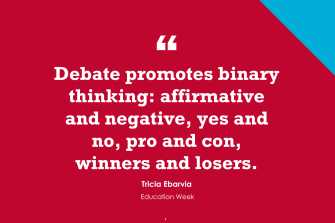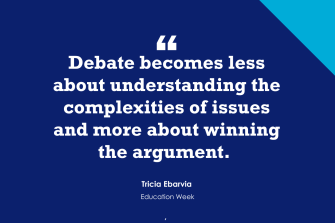This put up is an excerpt from educator Tricia Ebarvia’s new e book, Get Free: Antibias Literacy Instruction for Stronger Readers, Writers, and Thinkers.
You may see my interview with Tricia concerning the e book right here.
Speaking ‘With’ As an alternative of Speaking ‘Over’
Tricia Ebarvia is a lifelong educator, writer, speaker, and literacy advisor.
Some of the vital abilities our children can study in class—and why educating and studying is essentially human work—is the best way to have significant, genuine conversations with one another. Learn how to disagree with out being unpleasant. Learn how to pay attention and never simply hear. Learn how to begin from a spot of curiosity slightly than a spot of shutting down. Learn how to speak with as a substitute of speak over.
It’s not simple.
Whereas there are lots of causes that make significant dialog troublesome, generally it’s how we body classroom dialogue that will get in the best way. And one framing specifically—debate—virtually all the time does extra to deter dialog and understanding.
And by debate, I imply any exercise that frames dialogue a few complicated matter as an inventory of professionals versus cons, this versus that, proper versus improper. Typically this framing is intentional (I’m considering of many social research lessons), however generally even probably the most well-intentioned conversations can find yourself devolving right into a heated either-or debate that pits college students towards each other.
In fact, it’s simple to see why this would possibly occur. In spite of everything, many frequent library databases that college students use for analysis typically arrange their articles as professional and con. College students’ mentor texts for dialog in public discourse are pundits and diverse speaking heads speaking previous each other, whether or not that’s on a cable information program or sports activities evaluation. Televised political debates are much less about listening and extra about making newsworthy sound bites.
Whereas I acknowledge the potential worth of debate, my very own discomfort with it as an tutorial methodology is the best way debate promotes binary considering: affirmative and detrimental, sure and no, professional and con, winners and losers. Many, if not all, of our most urgent points going through us immediately can’t be diminished, a lot much less solved, utilizing such binary considering. Binary considering results in the oversimplification of complicated points. Nuance and exceptions to the rule, which all the time exist, are pushed to the margins in favor of neat, easy, clear options, which can or might not all the time be right.

Moreover, framing dialogue as debate compels college students to decide on sides, no matter whether or not or not that “facet” is defensible (or solely defensible in ways in which could possibly be doubtlessly dangerous). Within the best-case situation, debate would possibly provide college students a possibility to know one other perspective that they won’t essentially agree with. That is an important ability to have and intentional perspective-taking is essential to taking an anti-bias stance.
However when debate is framed to power college students to decide on one among two opposing sides, because it virtually all the time is, then debate turns into much less about understanding the complexities of points and extra about successful the argument. And I don’t find out about you, however I’ve but to fulfill an adolescent who doesn’t wish to win an argument (or not less than not lose, particularly in entrance of their friends).
We increase the stakes of conversations after we power college students into the binary development of debate. The purpose of debate is to win. But creating a deeper understanding of a posh concern typically requires us to lose—to search and to acknowledge the methods through which our considering is proscribed and even improper.

So how can we do that? What shifts can we make?
- As an alternative of brainstorming “sides” to an argument or concern, begin with the query about who cares. In different phrases, who would or ought to care about this concern? Ask college students to brainstorm all of the potential people or teams who could also be straight or not directly impacted by this concern. In my expertise, asking college students to see a problem from the angle and expertise of a selected particular person or group requires an empathy that summary positions about a problem don’t.
- Ask college students to determine the range and vary of views inside any specific group of people that care about this concern. Assist college students with texts that assist to disclose this range of opinions, or ask college students to analysis on their very own. A useful resource that may be useful is the Spectrum sequence on the Jubilee YouTube channel, through which the hosts learn statements to a selected group of individuals whose opinions fluctuate, regardless of having a shared identification.
- As soon as college students have a greater understanding of how specific teams would possibly really feel about a problem, ask them to work with different college students to seek out locations the place completely different teams might need shared and diverging pursuits: the place can completely different teams agree? the place do they disagree?
- Assist college students perceive that views usually are not mounted, that positions can change relying on the context and below differing circumstances. Ask college students to think about how a gaggle’s perspective concerning the concern would possibly change below completely different circumstances: which of them? why? and the way would possibly this transformation assist us to raised perceive the difficulty itself?
- Lastly, after contemplating a number of and diverse viewpoints of a number of completely different teams, then ask college students the place they agree and disagree. Encourage college students to assume past agreeing or disagreeing with a selected group. As an alternative, ask which components of a gaggle’s place they could agree or disagree with and below what circumstances. This train is an efficient instance of the best way to assist college students qualify their reasoning.
To assist see the complexities of a problem, I typically use the instance of wall paint. I usher in a number of completely different paint swatches in shades of white and grey. I ask college students which swatch is the “most correct shade of white” and “most correct shade of grey.” In fact, college students shortly see that that is unattainable. What counts as white—a lot much less what’s “correct”—relies upon each on the viewer and on how one shade of white compares to others. Some shades of white look extra yellow or blue when put next side-by-side with others. Some shades of grey look brighter or darker relying on whether or not we stand shut or distant.
On this similar means, our understanding of a problem additionally depends upon the place we stand: each the context and our personal positionality. There is no such thing as a either-or, black or white, professional or con. The problems we face immediately require empathy, versatile considering, and deep understanding of the complicated and sophisticated issues we face if we are able to even hope to handle, a lot much less clear up, them. As activist Margaret Wheatley (2009) reminds us:
We are going to achieve altering this world provided that we are able to assume and work collectively in new methods. Curiosity is what we’d like. We don’t need to let go of what we consider, however we do must be interested in what another person believes. We do must acknowledge that their means of deciphering the world may be important to our survival.

It’s this “willingness to be disturbed” that may lead us to what bell hooks (2010) calls “radical openness.” Quite than “grow to be hooked up to and protecting of” our present viewpoints and to “rule out different views,” we must be keen to “acknowledge what we don’t know.” This sort of openness—born from mental humility—is essential. Our issues are too large and too deep to not think about all that’s absolutely potential, however to take action, we should embody a radical openness to lean into conversations in all their complexities and, typically, their messiness.
Works Cited
Wheatley, M. (2009). Turning to at least one one other: Easy conversations to revive hope sooner or later. Berrett-Koehler Publishers.
hooks, b. (2010). Instructing essential considering: Sensible knowledge. Routledge.

Because of Tricia for contributing her ideas!
Think about contributing a query to be answered in a future put up. You may ship one to me at lferlazzo@epe.org. If you ship it in, let me know if I can use your actual identify if it’s chosen or when you’d want remaining nameless and have a pseudonym in thoughts.
You may as well contact me on Twitter at @Larryferlazzo.
Schooling Week has printed a set of posts from this weblog, together with new materials, in an e-book type. It’s titled Classroom Administration Q&As: Professional Methods for Instructing.
Only a reminder; you’ll be able to subscribe and obtain updates from this weblog by way of e mail. And when you missed any of the highlights from the primary 11 years of this weblog, you’ll be able to see a categorized listing under.
I’m additionally making a Twitter listing together with all contributors to this column.

